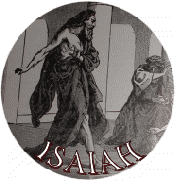
God’s Challenge To The NationsINTRO TO ISAIAH 13-23 |
Introduction to Isaiah 13-23These chapters (13-23) are distinctly set apart from the rest of the book. The introductory phrase of each section starts with the words “the oracle of” (other versions use “the burden of”). The phrase ends with the nation’s individual names. Sometimes the name of the nation or empire is not used, but some symbolical name. All of the nations included in the black list of nations are to some degree enemies of Israel except one, and that was Israel (Judah) itself. Each of these chapters has its own distinctives. These chapters are not just dry condemnations of nation after nation. They have character and emotion. Sometimes a theme can be developed from these judgment sections. Isaiah is not seen as a proud prophet but a sensitive man who cries at the destruction of his enemies. God not only has a special plan of destruction awaiting these nations but very often has a special word of hope or comfort, however little it may be. Sometimes it was an offer to change right away; other times the prophet predicted a renewal of that nation at some later date. Most importantly, we see different nations who would be supporting God’s work even though they were inherently His enemies. God does not have a simple 'judge and save' plan but was working, threatening and counseling each nation to its part in His own plan. The future was unclear, but it did leave a word of hope. Originally these sections or oracles were split up and whether they were sent to the nation addressed or as one has suggested that they were songs of war, we are not so sure. They seem to be addressed toward Israel (Judah) however, and assume at least Judah could have sung these songs. They were songs which brought hope at the darkest of times. They continued to give faith to a frail nation when ‘God’s country’ seemed on the brink of disaster. From reading them, one becomes confident that God indeed is in control and the land of God’s people will become the focus of the world (1). Each section has its own background but because they are placed out of any historical context then we can not accurately time these prophecies. Besides the final arrangement of these prophecies and their common approach, we find no inherent unity in the messages of these chapters. Most often in an outline of Isaiah these chapters are uninterestingly lumped together as God’s judgment upon the nations. But we must discover each section is a special message and how this message relates to our world today. Each case is different. In ths time of a coming world government, it does us well to better understand how God deals with Israel and the other nations. These 8 main sections can be divided into two smaller ones each with four subsections.
Chapters 19-23 primarily help us as individuals reflect more on the nations of the world. These nations include:
|
Chapters 13-18In chapters 13-18 we first see God’s righteousness revealed in its deep severity known as judgment which is merely a natural outworking of His righteousness. Although God seems not to be at all obligated to the world, we see mercy, another of God’s attributes infused in His treatment of the different nations. Assurance, protection and hope are brought into the otherwise very dismal situations. Another nation, namely Judah, is given the choice to choose which it really wants: God’s severity or God’s mercy. His principle of righteousness actually is a most powerful force to reckon with. |
Chapters 19-23It is not wrong to move the spot light from the theme of judgment to the reason of judgment. Each nation has its own story. Each has an account with God with a compiling deficit. Understanding God’s righteousness is a mighty big step in the process of becoming wise and understanding ourselves. Of course, the theme of God’s righteousness is dominant, but these other themes are apt to give us a better chance with rightly coping with God’s righteousness. Chapter 19 helps us to remember the limits of the world. Then we must deal with the problem that always comes up when dealing with God’s judgment, “What right does He have to judge us anyway?!” Isaiah clearly points out just how blind we really are to our human nature, God’s person and life in general. The last section becomes a last warning for those who think they have their lives all worked out especially in the area of finances. The world will find itself on a collision path with God’s terrible judgment when he trusts not in God. |
| Book of Isaiah: Plan and Outline Overview of the Book of Isaiah
Background of the Book of Isaiah A Historical Timeline of Isaiah
Section Introduction & Background |
Isaiah Expository Studies: The Bible Teaching Commentary Isaiah 6:1-12 Righteous Living |
BFF Homepage | Top | Back | Isaiah Overview | Next